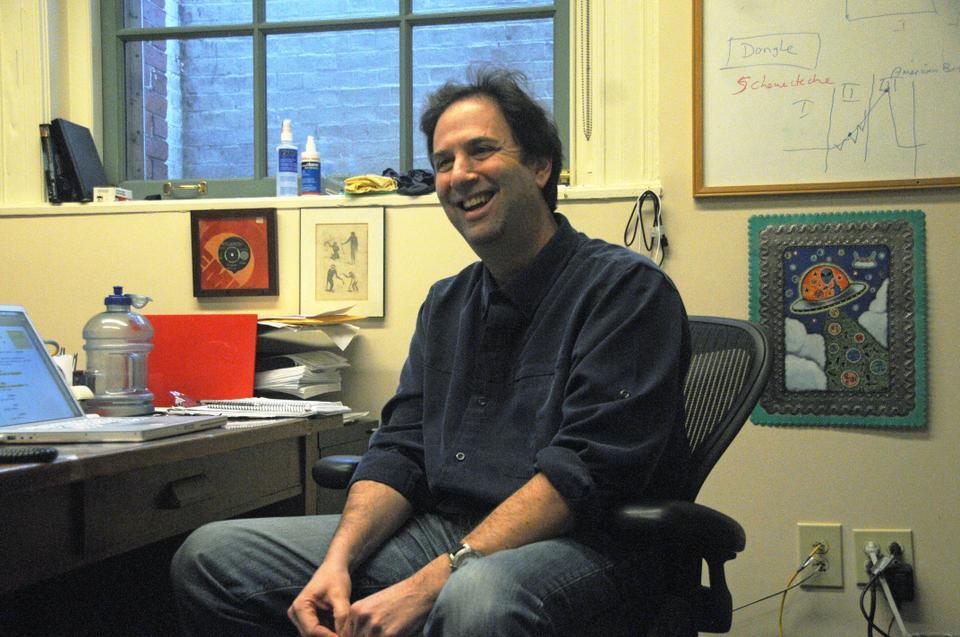
15 Questions with Daniel J. Rubin
Fifteen Minutes: First of all, how did you get involved in the film business?
Daniel J. Rubin: I was living in Chicago and doing a lot of different things. I was writing for a children’s television show, and I was working for two different theater groups. I was writing songs and performing at local clubs, and I wrote short films and produced them on the weekends using equipment from corporate media departments, and actors I knew from the theater, and somebody suggested I should write a movie, so I wrote a movie. And I sold it and thought, “That was easy,” so all of a sudden I was a writer.
2.FM: What was your fallback plan, if that hadn’t worked out? Is there another field that you would have gone into?
DJR: No. There was no plan [laughs]...I was just going in every direction and waiting for something to choose me, and that was the first thing that came along that actually broke out. I mean, I was writing corporate media films, and that was never something I wanted to do for a living. It was just better than flipping pizzas.
3.FM: You got your B.A. in Biology. How does that align with your other interests?
DJR: It was more of an evolution. I liked Biology and at some point I realized that it was easier for me to get a degree in Biology and just get a general undergraduate education than to switch to something else, and so I was taking courses in everything. And I was interested in the media, but I thought maybe I’d get involved in the science educational media or something like that. I wanted a job at Nova, but I couldn’t get it, so then I was like “Okay, now what?”
4.FM: Why screenwriting, as opposed to other forms of writing?
DJR: Because it came naturally for some reason. I had written short stories, and I never thought that I really got a handle on my voice, and I’m a lousy poet, and there’s something about the economy of screenwriting that seems natural to me.
5.FM: What exactly do you mean by the economy of screenwriting?
DJR: I think, for instance a novelist has the luxury of describing the room that they are in and every detail of the environment and the internal state of the character, but in screenwriting you really have to just get to the point, and I’m good at that.
6.FM: Do you think that you have a different outlook from other professors in English departments?
DJR: I haven’t asked them. But I do know that it is definitely helpful in a practical way. Screenwriting is a commercial art, and understanding how what you’re writing is perceived by the business of film is helpful.
7.FM: What’s the process like of getting a movie made? You write the script – then what happens?
DJR: Then I give it to my agent, and he says, “It’s wonderful, I’ll go sell it.” And then he doesn’t. [Laughs] And then I say, “What happened?” It goes something like that.
8.FM: Once it’s been picked up, what is the role of the screenwriter during filming?
DJR: It’s been a while. I’ve had three movies with my credits, and they’ve all been different. One movie was completely rewritten, and I didn’t really have anything to do with it; it was just sort of based on my original screenplay. On one movie, the director and I had a parting of the ways, and so I was not really involved once they began shooting, and then my best experience was “Groundhog Day,” where I was involved in preproduction and rewriting and the whole being-on-the-set shebang.
9.FM: What did “Groundhog Day” mean to you?
DJR: Well it’s all positive things. I mean, it’s very easily the defining work of my professional life, and no matter what I do from here on in, it’s the one I’m most associated with. It has brought me nothing but good things.
10.FM: Do you celebrate Groundhog Day in your household?
DJR: Pretty much. I mean, people call me from all over the place who wouldn’t cross the street to say “Boo” on my birthday. Friends, family, they always see “Groundhog Day” and go, “Oh, Danny, I should give him a call,” so I usually sit at home and field phone calls and e-mails. Sometimes we have a dance party, make a big pot of groundhog stew, which is any stew, but if you call it groundhog stew it becomes a celebration.
11.FM: What are your current projects?
DJR: I have two projects that I’m working on that are current, but one of them I wrote for the first time 10 years ago, and I’ve been rewriting it ever since. It keeps almost being produced and then nothing happens. As I pointed out to the producer last week, my daughter is 20. When I first wrote this she was 10.
12.FM: And the second project?
DJR: That’s another original script that I finally put on the marketplace, and I’ve gotten a couple of offers, so we’re negotiating.
13.FM: If you had to name your all time top five films, what would they be?
DJR: That’s tough, but I started a list just for references. I don’t know if this is actually it. These are actually things I just wanted to remember to make copies of for the students. I could say “Brazil,” “Blow Up,” “The Conversation,” “Kind Hearts and Coronaries.”
14.FM: One more.
DJR: Really, is that four? I don’t know. There must be something that I just watch and go, “Oh, I love that movie.” I don’t know, I don’t know. I guess I could say “Casablanca” if that’s not too boring.
15.FM: What advice would you give to aspiring screenwriters?
DJR: Keep writing.


